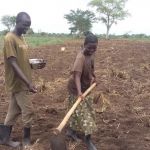The Power of SMS: How Simple Texts Can Provide a Lifeline for Farmers
Last month, nearly 3,000 coconut farmers in Mindanao received a text warning on their mobile phones that conditions were ripe for infestation by two devastating insect pests: Brontispa and Coconut Scale Insect, which shrivel and kill leaves and stunt tree growth. It put them on high alert, ready to report any pest sighting back to the Philippine Coconut Authority and to take action if needed.
The alerts are part of FarmerLink, an ambitious program that helped farmers survive a three-month drought and thrive despite the added pressures of an armed insurgency and martial law on the Philippine island of Mindanao.
Although it’s the world’s second-largest coconut producer, more than 60 percent of the 3.5 million coconut producers in the Philippines earn less than $400 per year. Their productivity is one-quarter that of high-producing countries. Although coconut farmers universally report that pests and disease affect their farms, they lack the know-how to manage these threats and in most cases, the awareness comes too late to reverse. Climate change presents mounting challenges, with more frequent pest outbreaks and extremes of drought, flooding and typhoons. At the same time, the lack of roads, bridges and the high cost of transportation prevents the timely delivery of services.
FarmerLink was launched in 2015 by Grameen Foundation, in partnership with the Philippines Coconut Authority, People’s Bank of Caraga, Franklin Baker, and other financial and technology partners. To our knowledge, it is the first digital rural advisory service to simultaneously link poor coconut farmers to an early warning system, vital agricultural training, financial services and market buyers.
The FarmerLink tool offers two-way communication, allows for offline data collection, and can be used in remote areas of the Philippines without the need for data connectivity. Field agents and other trusted local advisors use it to collect rich, real-time data on farmers that are critical to providing the customized support farmers need to be successful. Equally important, farmers receive personalized alerts and agronomic advice via SMS texts to reinforce the training provided by field agents, including financial advice to manage their farms.
We believe this model offers important lessons, especially as smallholder farmers face increasingly extreme climate conditions.
Meet farmers where they are
Farmers enrolled in FarmerLink were interviewed by a field agent who compiled data on their farming practices and household finances, and then created individualized farm plans. This allowed our partners to tailor services, including financing and inputs, to farmers’ needs. Similarly, we were able to triangulate data from weather stations, GPS farm coordinates and on-the-ground conditions to determine the likelihood of extreme weather conditions or of pest outbreaks, and then send SMS messages to those likely to be affected, along with advice on how to prepare or cope.
As Dennis Andres, regional manager for the Philippines Coconut Authority noted: “Our field agents do not operate in a vacuum. They are there to help, and FarmerLink enables us to stay in constant contact with our farmers, know them better and respond more quickly to their needs.”
Integrated services, partnerships are critical
Farmers face myriad challenges that often go beyond the scope of a single entity. This is especially true in the Philippines where the constant threat of typhoons puts farmers’ livelihoods and households at risk. (In 2013 alone, farmers lost 33 million trees to Typhoon Haiyan; it takes a coconut tree almost a decade to mature.)
When we first interviewed farmers, agricultural training and financial services were quickly identified as pressing needs. Only 11 percent of farmers had savings and had to rely on friends or family for money to improve their farms.
FarmerLink brought together different stakeholders to address these concerns: Given coconut’s importance to the country’s GDP, the Philippine Coconut Authority was keen to explore new avenues to grow the industry. Franklin Baker, the country’s leading producer of coconut products, had a vested interest in ensuring farmers provided a consistent supply of high-quality nuts. The People’s Bank of Caraga, a rural bank in Mindanao, began providing a special loan to support intercropping of cacao and coconut. This helped to diversify farmers’ incomes and build their resilience in tough times.
Understand gender dynamics
Women farmers in the Philippines often toil in the background with less access to resources, opportunities and information. We, therefore, had a specific focus on ensuring that half of the farmers served were women. Our research showed that wives were often the budget managers in their families, so the SMS program was also directed at them and included training in basic financial management to help families with long-term planning.
In just 18 months time, from pilot planning to execution, FarmerLink directly reached over 27,000 smallholder coconut farmers and their families—benefitting upward of 135,000 family members. In that time, the system also proved that it could help farmers navigate natural disasters and operate despite the societal conflict. It’s this adaptability that makes this model especially beneficial in challenging regions.
Gigi Gatti is the regional director, Asia, and country director, Philippines, for Grameen Foundation.
Top image: Thanks to an early warning alert from FarmerLink, Generosa Gonato and her husband prevented bud root, a common disease, from wiping out their coconut trees. (Photo: Grameen Foundation)
- Categories
- Agriculture, Technology



